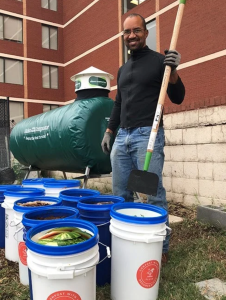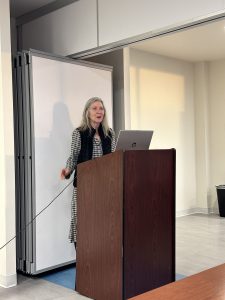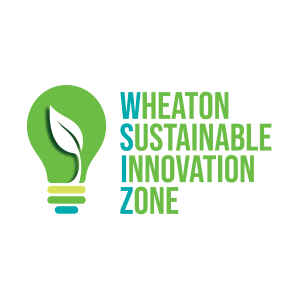How to Make Your Montgomery County Businesses More Sustainable: Tackling Food Waste
By Alicja Mazurkiewicz, Bethesda Green Intern
The Wheaton Sustainable Innovation Zone (WSIZ) hosted a community event “Tackling Food Waste” for business owners in Montgomery County to learn about compositing. At the event, entrepreneurs, county officials, and local business owners shared strategies to mitigate commercial food waste. Here are some resources and ideas for businesses to reduce their food waste:
 Loop Closing, founded by Jeffery Neal, is a private company that makes it easier for businesses to compost their food scraps. Rather than having food scraps hauled away, Loop Closing installs sofa or car sized composting machines at businesses to allow for composting on-site. The system allows for a “continuous flow” in which there is always composting material coming in, and finished compost coming out, which Neal envisions being used to regenerate soils locally. The composting machine mimics natural aerobic degradation processes found in nature in a forest, which yields no stench. If these small machines were to be deployed on a larger scale at commercial establishments, food waste diversion potential would be substantial. So far, Loop Closing has successfully initiated 12 pilot projects in the DMV. Interested in installing an on-site composter? Check out Loop Closing here.
Loop Closing, founded by Jeffery Neal, is a private company that makes it easier for businesses to compost their food scraps. Rather than having food scraps hauled away, Loop Closing installs sofa or car sized composting machines at businesses to allow for composting on-site. The system allows for a “continuous flow” in which there is always composting material coming in, and finished compost coming out, which Neal envisions being used to regenerate soils locally. The composting machine mimics natural aerobic degradation processes found in nature in a forest, which yields no stench. If these small machines were to be deployed on a larger scale at commercial establishments, food waste diversion potential would be substantial. So far, Loop Closing has successfully initiated 12 pilot projects in the DMV. Interested in installing an on-site composter? Check out Loop Closing here.
Montgomery County Department of Environmental Protection (DEP) and the Recycling and Resource Management Division have various programs to combat food waste. DEP estimates that about 124,000 tons of food scraps are generated and disposed of each year in Montgomery County, of which 68,000 tons comes from the commercial sector. Alan Fulton, the recycling coordinator with DEP said the county now has a goal of reducing waste and recycling more, aiming for zero waste.Food scraps are an important part of the picture. In 2018, DEP put out a strategic plan to advance composting, compost use, and food scrap diversion in Montgomery County.
DEP’s Commercial Food Scraps Recycling Partnership Program works with businesses to implement food waste reduction to allow them to obtain contracts with private contractors and companies. Over the three years that the program has been active, Fulton says that DEP has worked with more than 30 partners and collected and recycled over 1.4 million pounds of pre-consumer commercial food scraps.
DEP’s new and growing Residential Composting Pilot Program runs a weekly curbside collection of food scraps. Currently, the program runs in areas of Silver Spring and Potomac. It will soon expand to additional pilot areas, with the goal of ultimately establishing a countywide residential food recycling program.
 Some additional ways businesses and restaurants can improve their environmental impact include adopting sustainable sourcing practices, opting for plant-based menus/diets, reducing waste, and setting up solar or wind-powered energy – whether it be installing solar panels, or opting for community solar. For example, Kit Wood is the owner of Green Plate Catering in Silver Spring discussed Green Plate’s philosophy of supporting the local community and respecting the environment, as well as sustainable practices her business engages in like environmentally responsible and local sourcing practices, plant-based menus, and a zero-waste kitchen powered by wind and solar power. Wood also highlighted Green Plate’s use of non-disposable and compostable dishware from the preparation to the packaging process. Wood emphasized the importance of education for local businesses to realize the benefits of composting, urging local businesses and the broader community to educate and encourage each other and to take advantage of DEP’s food scraps programs. Green Plate Catering is also a Montgomery County Certified Green Business.
Some additional ways businesses and restaurants can improve their environmental impact include adopting sustainable sourcing practices, opting for plant-based menus/diets, reducing waste, and setting up solar or wind-powered energy – whether it be installing solar panels, or opting for community solar. For example, Kit Wood is the owner of Green Plate Catering in Silver Spring discussed Green Plate’s philosophy of supporting the local community and respecting the environment, as well as sustainable practices her business engages in like environmentally responsible and local sourcing practices, plant-based menus, and a zero-waste kitchen powered by wind and solar power. Wood also highlighted Green Plate’s use of non-disposable and compostable dishware from the preparation to the packaging process. Wood emphasized the importance of education for local businesses to realize the benefits of composting, urging local businesses and the broader community to educate and encourage each other and to take advantage of DEP’s food scraps programs. Green Plate Catering is also a Montgomery County Certified Green Business.
Bethesda Green runs the Montgomery County Green Business Certification Program (currently under construction).The Certification can help guide businesses on more sustainable practices. Sign up to the Bethesda Green newsletter to receive updates!
If you would like any more information about the resources shared, contact info@WSIZmd.org or visit www.wheatonsustainableinnovationzone.com.
About the Wheaton Sustainable Innovation Zone
WSIZ is a collaboration between Bethesda Green, Global Urban Development (GUD), Montgomery County Economic Development Corporation (MCEDC), and One Montgomery Green to strengthen economic development efforts and climate resilience and promote innovation in a diverse urban community in Wheaton, MD. WSIZ has four goals: green savings, green opportunities, green talent, and green places. As Wheaton is an Equity Focus Area of Montgomery county, the initiative has a foundation of diversity, justice, equity, and inclusion woven throughout the process to reflect the diverse backgrounds and cultures of Wheaton residents. The project is funded by the U.S. Department of Energy’s Inclusive Energy Innovation Prize.





